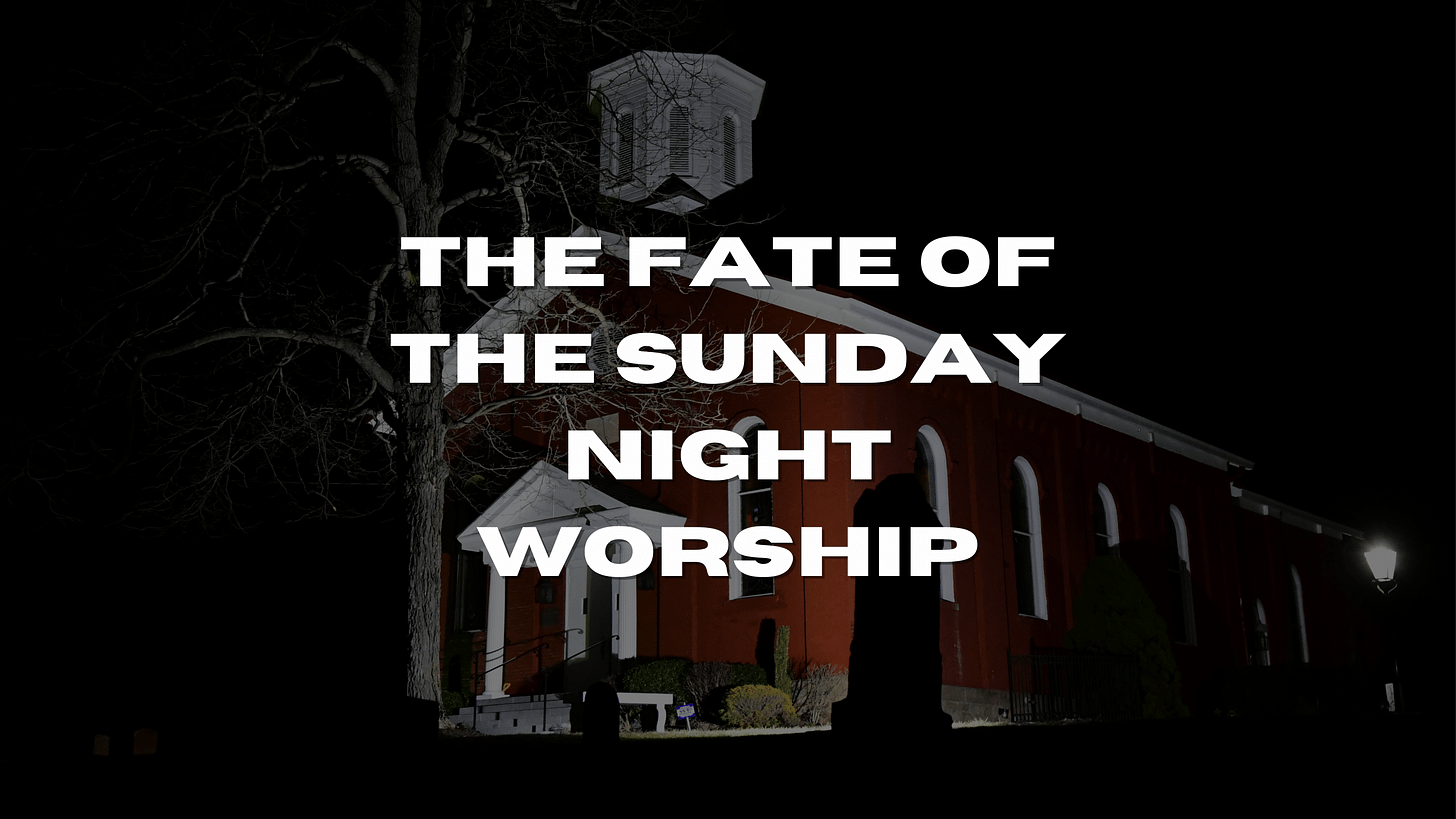The Fate of the Sunday Night Worship
A change of plans?
One of the more interesting vestiges of the COVID era has been the fate of the Sunday evening worship hour.
For many churches, the radical shakeup of life’s familiar ways provided a rare opportunity to circumvent the “we’ve always done it that way” hurdle.
Resistance to change was often met with questions about the visitor who might stop by, or the person who was not able to get the Lord’s Supper due to work or other unavoidable hindrances. When those reasons became invalid for a time, it gave churches some breathing room to see how much pull those arguments should have.
While those are valid concerns that are worth weighing, I think it’s a positive shift that the primary concern has become the good of the congregation as a unit. To paraphrase Jesus in Mark 2:27, man was not made for Sunday night worship, but Sunday night worship for man.
A variety of options
Where it seemed that previously, churches largely chose between two Sunday night setups, a number of options are now available.
In a lot of cases, after the first few months of upheaval, churches went back to their normal 5 or 6 pm second gathering. On the other hand, some have entirely done away with a second gathering.
Long before 2020, many churches had switched to Sunday night small groups. This has the advantage of offering more close-contact fellowship—though the practice has many detractors.
Others have gone to an extended “church-eat-church” setup with a lunch break followed immediately by the afternoon worship. This has the advantage of cutting down on commutes for those who live farther away—an increasing concern in areas with declining church options.
The congregation I attend (and the previous one I served) went to a modified half-worship/half-class service shortly after the morning worship ended. Instead of a second, unrelated sermon, the message is a deeper dive into the AM sermon topic, with an opportunity for everyone to ask questions and follow-up on ideas that were mentioned. It has been met positively in both cases as an aid for better retention.
Ultimately, the best answer for your church is the one that best keeps the saints connected and educated.
I write this because I want to open the floor to you. Rarely do we get the opportunity to rethink such an entrenched practice, so it fascinates me that we’ve gotten exactly that.
So, what has your church done, and what do you think of it? What advantages (or disadvantages) do you see in yours or any other Sunday PM practices? Did I miss any options? Let me know in the comments.
Notes
This week’s Think Deeper Podcast weaves the Cracker Barrel controversy, the DC crime cleanup, and other headlines into a discussion of building a church culture. Listen and use the subscribe links at focuspress.org/thinkdeeper
Looking for a textual study? Pick up my guide to Mark’s Gospel! Available here
As always, subscribing to the email list is FREE, but if you’d like to support my work, go to jackwilkie.co/subscribe




Really appreciate you opening up this conversation. It’s interesting how COVID created space for churches to re-examine practices we assumed were immovable. I like how you framed it with Mark 2:27—reminding us that the structure should serve the people, not the other way around.
I don’t think there’s a one-size-fits-all answer, but I agree—the healthiest setup is the one that keeps people truly connected, growing, and equipped. Thanks for sharing!
Thanks Jack. My 2 cents: we need to be TOGETHER a lot more than we are. I think we need far more one another fellowship time to really get to know one another more deeply. Our Sunday and Wednesday Bible classes, services often are not focused on loving one another but on Bible study and teaching. It takes lots of time together for real love to grow. I agree with your statement: we need a strategy that keeps us connected and educated.